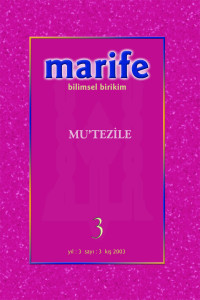Mu’tezile Ekolü Teşekkülü, İlkeleri ve İslâm Düşüncesine Katkıları
Abstract
In the history of Islamic thought, the Mu’tazilite School is characterized by its particular method in understanding and interpreting the Islamic precepts. First of all, The Mu’tazilite theologians laid down their principles as ‘al-usūl al-khamsah (five roots or fundamentals)’ and focused on theological and philosophical issues. The Mu’tazilite thinkers are most often described as rationalist, individualist, liberal and eccentric figures. Among the Mu’tazilite famous thinkers are Wasil b. ‘Ata, ‘Amr b. ‘Ubayd, Abu al-Huzayl al-‘Allaf, Bishr al-Mu’tamir, Nazzam, Cahiz, Djubbai and his followers. The Mutazilite School has emphasized on the Unity and the Purity of Divine Existence and the Jus-tice. In the context of the idea of Unity, it has discussed Allah-cosmos relation, atom, motion, rest and Divine atributites. In the context of the concept of Justice, the Mutazilite school has underlined that the responsibility of the deeds, such as good-bad, belief-unbelief, submission-disobedience, in this world or in the hereafter, belongs to human himself. In other words, this school has connected the human responsibility to mind, freewill and the potential power. In this context, this article attempts to provide insights into the formation and the principles of the Mutazilite school alongside with its contributions to the Islamic thought.
References
- ................................................................................................................................................................................................................................
Details
| Primary Language | Turkish |
|---|---|
| Subjects | Religion, Society and Culture Studies |
| Journal Section | Research Article |
| Authors | |
| Publication Date | December 31, 2003 |
| Published in Issue | Year 2003 Volume: 3 Issue: 3 |
This work is licensed under a Creative Commons Attribution-NonCommercial 4.0 International License.

